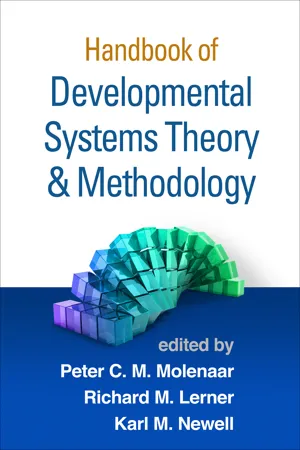
eBook - PDF
Handbook of Developmental Systems Theory and Methodology
- 517 pages
- English
- PDF
- Available on iOS & Android
eBook - PDF
Handbook of Developmental Systems Theory and Methodology
About this book
Developmental systems theory provides powerful tools for predicting complex, dynamic interactions among biological and environmental processes in human behavior and health. This groundbreaking handbook provides a roadmap for integrating key concepts of developmental systems theory (such as self-organization, reciprocal dynamic interaction, and probabilistic epigenesis) and simulation models (connectionist and agent-based models) with advanced dynamic modeling approaches for testing these theories and models. Internationally renowned developmental science scholars present innovations in research design, measurement, and analysis that offer new means of generating evidence-based decisions to optimize the course of health and positive functioning across the life span. Topics include epigenetic development and evolution; the relationship between neural systems growth and psychological development; the role of family environments in shaping children's cognitive skills and associated adult outcomes, and more.
Frequently asked questions
Yes, you can cancel anytime from the Subscription tab in your account settings on the Perlego website. Your subscription will stay active until the end of your current billing period. Learn how to cancel your subscription.
No, books cannot be downloaded as external files, such as PDFs, for use outside of Perlego. However, you can download books within the Perlego app for offline reading on mobile or tablet. Learn more here.
Perlego offers two plans: Essential and Complete
- Essential is ideal for learners and professionals who enjoy exploring a wide range of subjects. Access the Essential Library with 800,000+ trusted titles and best-sellers across business, personal growth, and the humanities. Includes unlimited reading time and Standard Read Aloud voice.
- Complete: Perfect for advanced learners and researchers needing full, unrestricted access. Unlock 1.4M+ books across hundreds of subjects, including academic and specialized titles. The Complete Plan also includes advanced features like Premium Read Aloud and Research Assistant.
We are an online textbook subscription service, where you can get access to an entire online library for less than the price of a single book per month. With over 1 million books across 1000+ topics, we’ve got you covered! Learn more here.
Look out for the read-aloud symbol on your next book to see if you can listen to it. The read-aloud tool reads text aloud for you, highlighting the text as it is being read. You can pause it, speed it up and slow it down. Learn more here.
Yes! You can use the Perlego app on both iOS or Android devices to read anytime, anywhere — even offline. Perfect for commutes or when you’re on the go.
Please note we cannot support devices running on iOS 13 and Android 7 or earlier. Learn more about using the app.
Please note we cannot support devices running on iOS 13 and Android 7 or earlier. Learn more about using the app.
Yes, you can access Handbook of Developmental Systems Theory and Methodology by Peter C. M. Molenaar,Richard M. Lerner,Karl M. Newell, Peter C. M. Molenaar, Richard M. Lerner, Karl M. Newell in PDF and/or ePUB format, as well as other popular books in Psychology & Statistics for Business & Economics. We have over one million books available in our catalogue for you to explore.
Information
Table of contents
- Cover
- Half Title Page
- Title Page
- Copyright
- Preface
- Contents
- Part I. Introduction
- Part II. Relational Developmental Systems Theory
- Part III. Epigenetic Development and Evolution
- Part IV. Neural Networks and Development
- Part V. Dynamics of Development
- Part VI. Dynamics of Social Interaction
- Part VII. Nonlinear Dynamical Models of Development
- Part VIII. Nonergodic Developmental Systems
- Part IX. Complex Systems Models in Human Development: Reevaluation and Future Directions
- Author Index
- Subject Index
- About the Editors
- Contributors